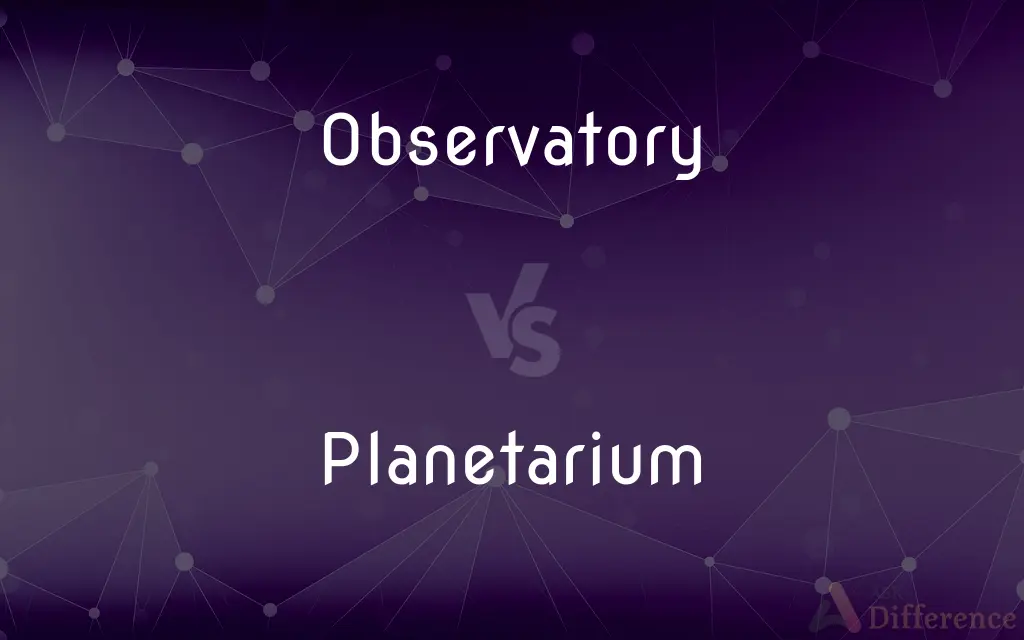Observatory vs. Planetarium — What's the Difference?
By Fiza Rafique & Urooj Arif — Updated on March 18, 2024
Observatory is facility equipped with telescopes for observing celestial events, focusing on scientific research, while planetarium is theater built to project images of the stars, planets, & other celestial phenomena onto a domed ceiling for education.

Difference Between Observatory and Planetarium
Table of Contents
ADVERTISEMENT
Key Differences
An observatory is primarily a scientific installation equipped with advanced telescopes and other observational instruments used by astronomers to study celestial bodies and phenomena. In contrast, a planetarium is a theater designed to simulate the night sky for educational and entertainment purposes.
The key distinction between an observatory and a planetarium lies in their primary functions and the experiences they offer. Observatories are dedicated to the scientific study of the cosmos, providing astronomers with the tools needed to explore the universe's mysteries. On the other hand, planetariums are educational spaces designed to inspire and educate people about astronomy and the wonders of the night sky, using simulations rather than direct observation.
While observatories contribute to our understanding of the universe through research and discovery, planetariums play a crucial role in public science education, sparking interest in astronomy and science among people of all ages. Both facilities, despite their different focuses, share the common goal of deepening our knowledge and appreciation of the cosmos.
Observatories are often located in remote areas or at high altitudes to minimize light pollution and atmospheric interference, which can obstruct clear celestial observations. While planetariums serve an educational role, making astronomy accessible and engaging to the public, they do not facilitate actual celestial observations or research.
Comparison Chart
Primary Purpose
Scientific research and direct observation of celestial bodies.
Education and entertainment through simulated night skies.
ADVERTISEMENT
Equipment
Telescopes, cameras, and other astronomical instruments.
Projection systems and domed ceilings for simulations.
Location
Often in remote or high-altitude areas to reduce interference.
Typically located in urban areas for public access.
Observation
Direct observation of stars, planets, and galaxies.
Simulated views of the cosmos for educational purposes.
Audience
Astronomers and researchers.
General public, including students and astronomy enthusiasts.
Compare with Definitions
Observatory
Designed for scientific studies of the universe.
The observatory contributed to the discovery of a new exoplanet.
Planetarium
Aimed at inspiring and educating the public about astronomy.
School trips to the planetarium spark children's interest in space.
Observatory
Often situated in locations with clear skies.
The high-altitude observatory offers unparalleled views of the night sky.
Planetarium
Serves as a tool for astronomy education and entertainment.
The planetarium's interactive exhibits teach visitors about the solar system.
Observatory
Focuses on direct observation and research.
Researchers at the observatory are tracking an approaching comet.
Planetarium
A theater that simulates the night sky for educational purposes.
The city's planetarium hosts weekly shows about the constellations.
Observatory
A facility for observing celestial phenomena with telescopes.
The Mauna Kea Observatories are renowned for their astronomical research capabilities.
Planetarium
Utilizes projection technology to display celestial images.
The planetarium's advanced projector offers stunning visuals of the Milky Way.
Observatory
Equipped with specialized instruments for space observation.
The observatory's powerful telescope allows for detailed studies of distant galaxies.
Planetarium
Features presentations on astronomical topics.
The planetarium offers a popular show on the history of space exploration.
Observatory
An observatory is a location used for observing terrestrial, marine, or celestial events. Astronomy, climatology/meteorology, geophysical, oceanography and volcanology are examples of disciplines for which observatories have been constructed.
Planetarium
A planetarium (plural planetaria or planetariums) is a theatre built primarily for presenting educational and entertaining shows about astronomy and the night sky, or for training in celestial navigation.A dominant feature of most planetaria is the large dome-shaped projection screen onto which scenes of stars, planets, and other celestial objects can be made to appear and move realistically to simulate the complex 'motions of the heavens'. The celestial scenes can be created using a wide variety of technologies, for example precision-engineered 'star balls' that combine optical and electro-mechanical technology, slide projector, video and fulldome projector systems, and lasers.
Observatory
A building, place, or institution designed and equipped for making observations of astronomical, meteorological, or other natural phenomena.
Planetarium
An apparatus or model representing the solar system.
Observatory
A structure overlooking an extensive view.
Planetarium
An optical device for projecting images of celestial bodies and other astronomical phenomena onto the inner surface of a hemispherical dome.
Observatory
A place where stars, planets and other celestial bodies are observed, usually through a telescope; also place for observing meteorological or other natural phenomena.
Planetarium
A building or room containing a planetarium, with seats for an audience.
Observatory
A lookout vantage point with a view of the surrounding area
Planetarium
A display museum in which images of stars and other astronomical phenomena are projected onto a domed ceiling.
Observatory
A place or building for making observations on the heavenly bodies.
The new observatory in Greenwich Park.
Planetarium
An orrery.
Observatory
A building fitted with instruments for making systematic observations of any particular class or series of natural phenomena.
Planetarium
An orrery. See Orrery.
Observatory
A place, as an elevated chamber, from which a view may be observed or commanded.
Planetarium
A building housing an instrument for projecting the positions of the planets onto a domed ceiling
Observatory
A lookout on a flank of a battery whence an officer can note the range and effect of the fire; usually referred to as an observation post.
Planetarium
An optical device for projecting images of celestial bodies and other astronomical phenomena onto the inner surface of a hemispherical dome
Observatory
A building designed and equipped to observe astronomical phenomena
Planetarium
An apparatus or model for representing the solar systems
Observatory
A structure commanding a wide view of its surroundings
Common Curiosities
Can you see real stars in a planetarium?
No, planetariums use projection technology to simulate images of stars and celestial phenomena on a domed ceiling, rather than showing real stars.
Why are observatories often located in remote areas?
Observatories are located in remote or high-altitude areas to minimize light pollution and atmospheric interference, which can obstruct clear celestial observations.
Can anyone visit an observatory?
Many observatories offer public viewing nights and educational programs, though their primary function is scientific research. Access might be limited compared to planetariums, which are designed for the public.
What is the main difference between an observatory and a planetarium?
The main difference is that observatories are used for scientific research and direct celestial observation, while planetariums provide educational and entertainment experiences through simulated night skies.
Do planetariums contribute to astronomical research?
While planetariums primarily focus on education and do not conduct research, they play a crucial role in public science education and can inspire future astronomers.
What makes planetariums popular among students and educators?
Planetariums make learning about astronomy interactive and engaging through visually stunning presentations and shows, enhancing educational experiences in science.
Can the technology used in planetariums simulate current astronomical events?
Yes, modern planetariums can simulate current astronomical events, allowing visitors to experience recent celestial phenomena regardless of weather or location.
How do astronomers use observatories for research?
Astronomers use the telescopes and instruments at observatories to observe celestial events, conduct experiments, and gather data for research on various astronomical phenomena.
What advancements have observatories contributed to astronomy?
Observatories have been instrumental in many astronomical advancements, including the discovery of planets, the study of distant galaxies, and the observation of cosmic phenomena.
Are planetarium shows based on real astronomical data?
Yes, planetarium shows often use real astronomical data to accurately simulate the night sky and celestial events, making astronomy accessible to everyone.
Share Your Discovery

Previous Comparison
Rapture vs. Rhapsody
Next Comparison
Graf vs. GraffAuthor Spotlight
Written by
Fiza RafiqueFiza Rafique is a skilled content writer at AskDifference.com, where she meticulously refines and enhances written pieces. Drawing from her vast editorial expertise, Fiza ensures clarity, accuracy, and precision in every article. Passionate about language, she continually seeks to elevate the quality of content for readers worldwide.
Co-written by
Urooj ArifUrooj is a skilled content writer at Ask Difference, known for her exceptional ability to simplify complex topics into engaging and informative content. With a passion for research and a flair for clear, concise writing, she consistently delivers articles that resonate with our diverse audience.














































